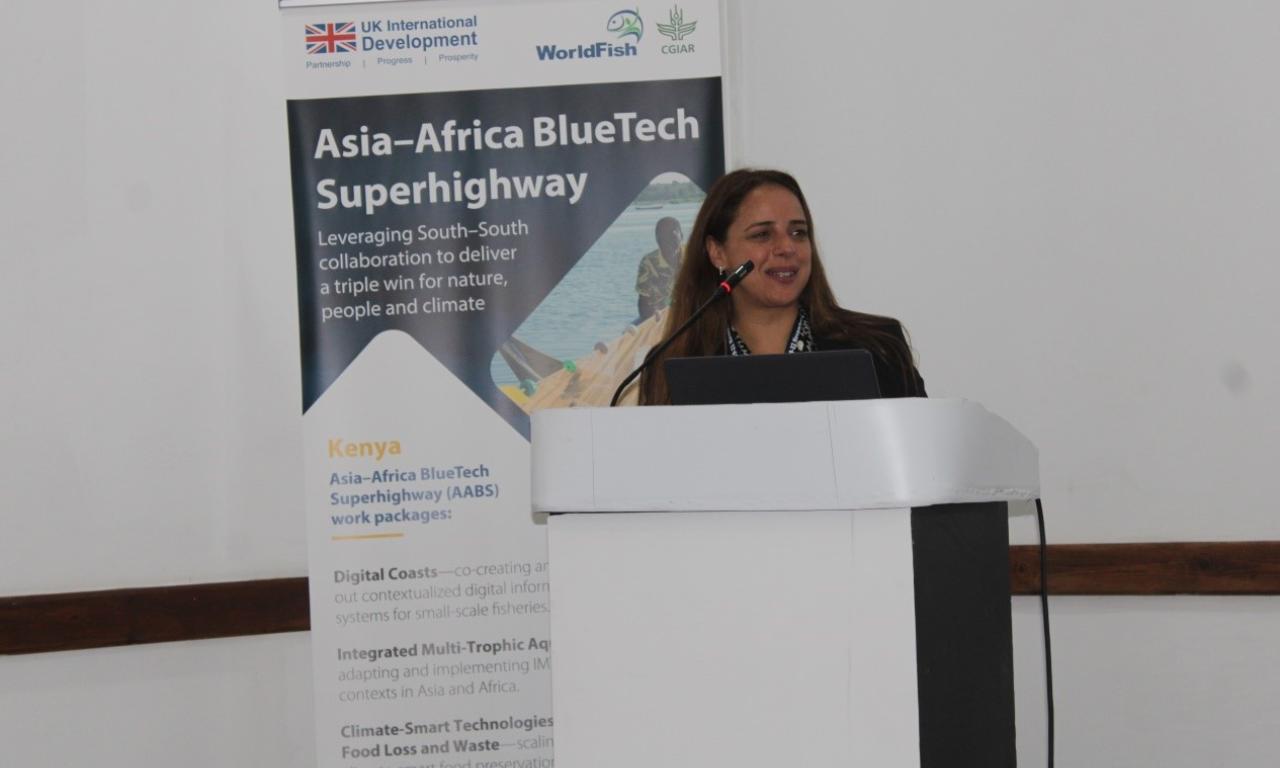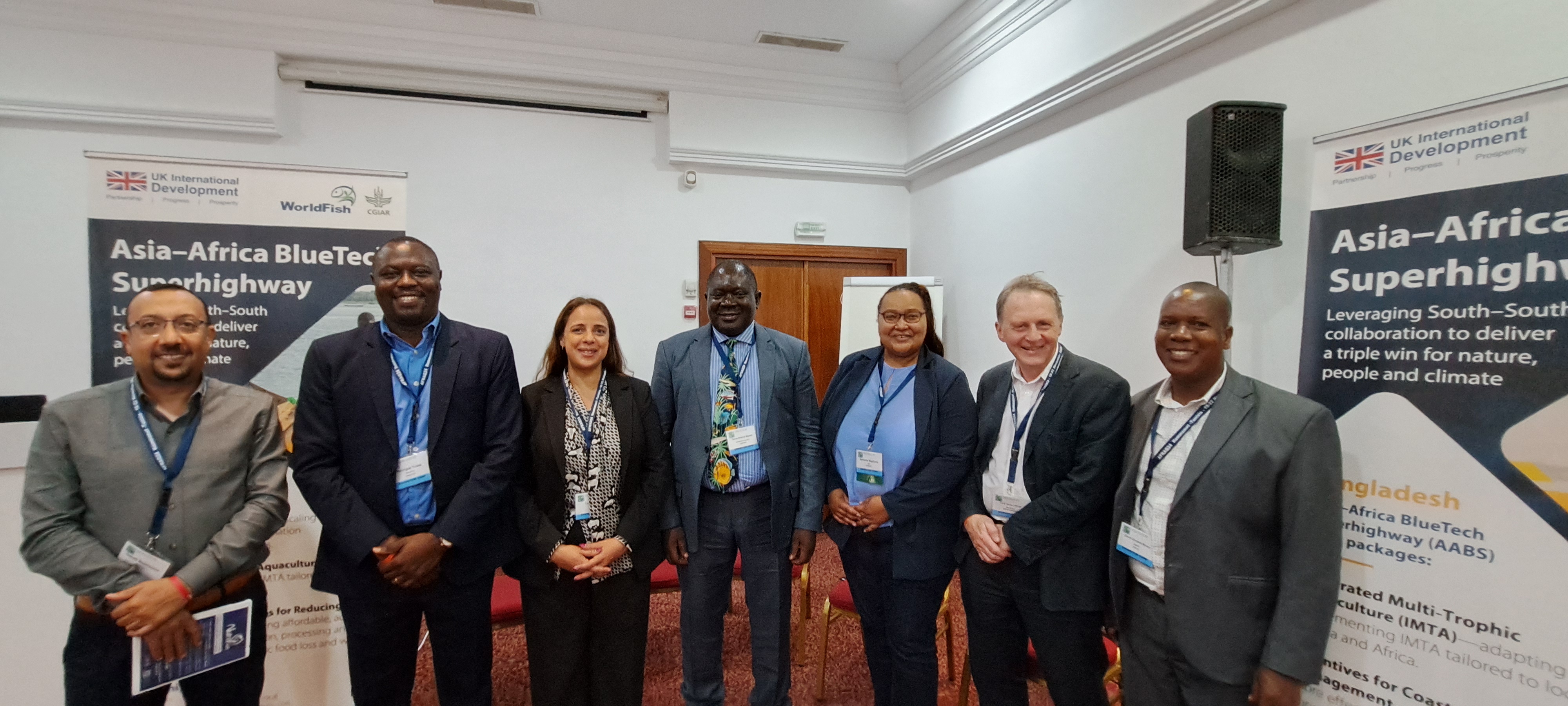
Experts raised awareness of Integrated Multi-Trophic Aquaculture (IMTA) and its potential to improve food security and tackle climate change at an Asia-Africa BlueTech Superhighway (AABS) event for Aquaculture Africa (AFRAQ) this year, hosted in Hammamet, Tunisia.
On 20 November, an interactive session entitled Thriving Blue Economy through Sustainable Aquaculture took place, chaired by Dr Leila Basti, a Senior Scientist for Aquatic Farming Practices at WorldFish and Lead of AABS Work Package 2 on IMTA, and featured a panel discussion of experts including Dr David Mirera, Senior Research Scientist and Assistant Director in charge of Mariculture Research and Development at Kenya Marine and Fisheries Research Institute (KMFRI); Dr David Verner-Jeffreys an Aquatic Health Senior Scientist at WorldFish; Dr Ibrahim Mgawe Chair of the Board of Directors of Tanzania Fisheries Research Institute (TAFIRI); and Samantha Mapfumo, Fish for Food Security in Zambia Project Coordinator at GIZ.
Following an introduction to AABS by Dr Rodrigue Yossa, Director of Aquatic Foods Biosciences at WorldFish, the session raised awareness of AABS work to develop, implement and scale up sustainable, nature-positive and climate-smart coastal and marine integrated aquaculture, engaging an audience of scientists from the private and public sectors, as well as the African Union.

The Power of Integrated Multi-Trophic Aquaculture
The panel discussion focused on the transition from conventional aquatic monocultures to IMTA systems to achieve sustainability, which is a key objective of AABS as a pathway to fostering a blue economy.
The panelists explored how IMTA can be expected to contribute to the improvement of food security in Africa both at large and within the context of climate change. As IMTA is land efficient, using only a small component to produce several organisms, the approach enhances food security and production by deriving multiple products from a single space. This can be especially valuable in improving the diversification of value chains in Sub-Saharan Africa to solve problems in aquaculture and address issues caused by climate change.
The discussion emphasized why IMTA is beneficial to both farmers and the environment because of the environmental integrity of the system and the diversity in the species farmed, which allows for increased income from a single production cycle. Dr Mirera said,
“IMTA is going a long way to solve the issue of climate change. We have assumed that the seaweed we are farming is equally extracting carbon from the environment through the water system and so, by introducing seaweed through IMTA into the water system, we are in a way trying to sequester carbon… it is an area that we need to advance so that is actually able to be documented and popularized.”
The panelists highlighted the importance of early planning for aquatic health as part of developing IMTA, particularly focusing on the concept of One Health, and debated the incorporation of genetic tools and innovative new technologies.
Preventing Aquatic Food Loss
The panel also discussed the challenges of food loss and waste. One single solution cannot address all aspects that lead to losses at different nodes, so interventions from a variety of angles are required, such as from policy, regulatory, technological, infrastructure, marketing, gender and social perspectives. Dr Mgwawe noted,
“The problem of fish loss is complex and has many variables, which needs a multi-dimensional solution. A combination of different solutions will give optimal results.”
AABS is consolidating and revising the fish loss assessment protocol, which was first developed in 2011. Currently, some assessments have been completed using the revised version and a multi-dimensional solution to achieve practical impact.
The Global Reach of Asia-Africa BlueTech Superhighway
During the Q&A, attendees asked about IMTA system design, genetics in aquaculture, genetically modified organisms versus selective breeding, fish feed, food loss and related quantitative methodologies, aquatic animal health management, community-based aquaculture, early-warning systems, gender, training and capacity building.
The discussion drew attention to gender inclusion given that women are involved across almost the entire value chain. One female audience member from Kenya said,
“We as women are excited with projects that also look at value addition and we will be happy to not only be a statistic that women take on ore processing jobs but that the project can be able to align women in all the nodes of the value chain to be able to also effectively contribute to the sector.”
Audience members also inquired about the expansion of AABS to other countries beyond Nigeria, Kenya and Bangladesh where IMTA work is taking place - either physically or through readily available and accessible online materials.
The event at AFRAQ reinforced the importance of bringing together diverse stakeholders to drive sustainable aquaculture forward in Africa and globally.

